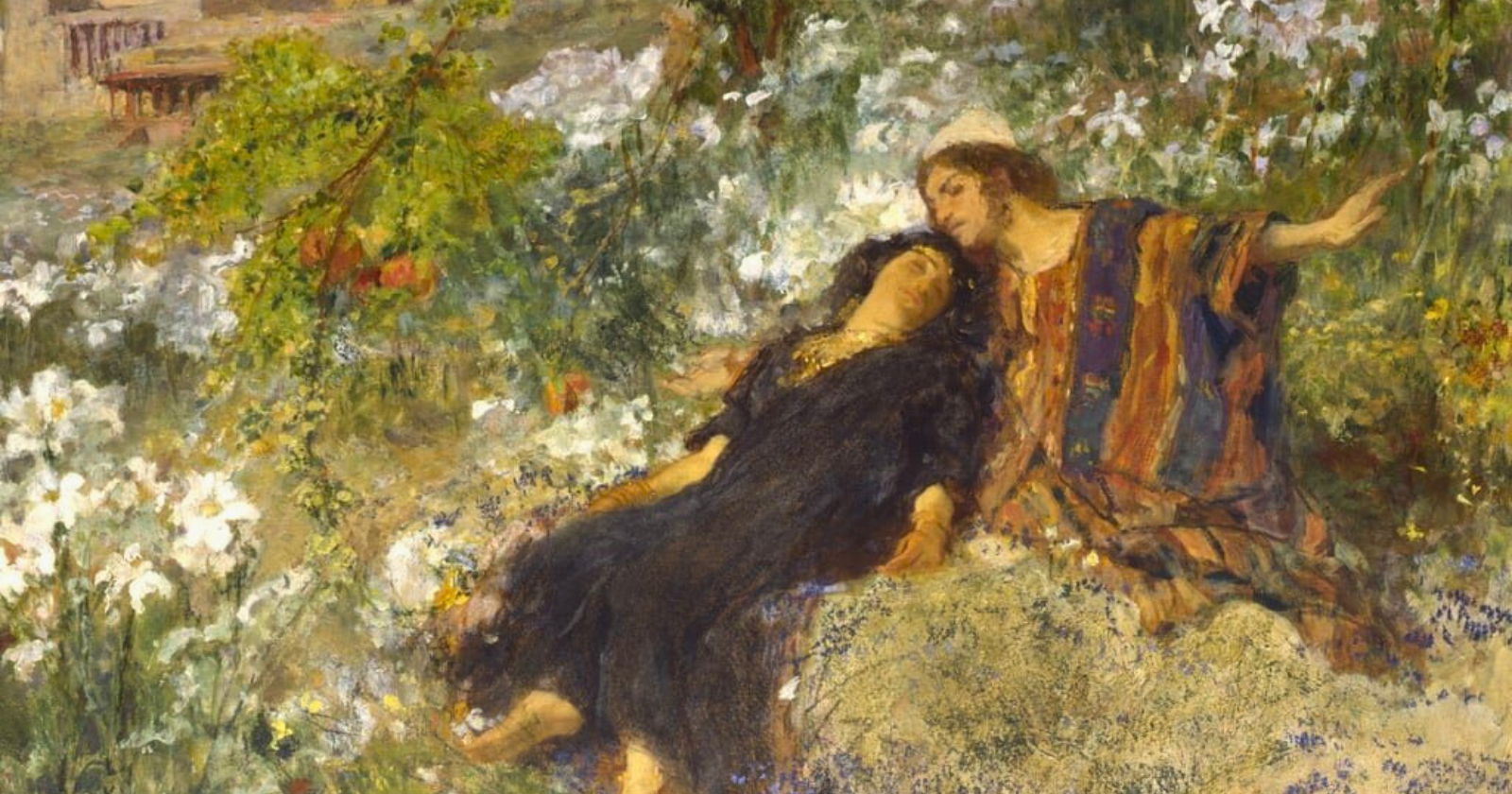The Song of Songs stands as a profound symbol of love and mysticism, a scripture that Kabbalists revere for its esoteric wisdom.
This biblical canticle invites you into an allegorical exploration of divine love, guiding Christians on a path to spiritual intimacy and personal growth.
Our journey through this text will uncover its hidden meanings and offer everyday applications for a richer, more spiritually attuned life.
Let’s explore the mystical dimensions of the Song of Songs and see how it can enrich your spiritual practice and relationships.
What’s the Song of Songs about?
The Song of Songs, or “Shir HaShirim,” is a Hebrew way of saying the most excellent of all songs. It’s a celebration of love and a treasured part of biblical wisdom literature.
Unlike other wisdom literature that often focuses on moral teachings or existential questions, the Song of Songs reveals an intimate dialogue between two lovers, embracing both the physical and emotional facets of love.
This exchange is more than mere conversation — it is a lyrical dance that weaves together admiration, desire, and deep emotional connection.
The male voice exclaims, “Behold, you are beautiful, my love; behold, you are beautiful; your eyes are doves” (1:15). Then, the female responds, “Behold, you are beautiful, my beloved, truly delightful” (1:16).
This mutual affirmation is central to the poem’s structure and its enduring appeal.
The dialogue form allows for several key features:
- A balanced and intimate portrayal of both voices, emphasizing equality and reciprocity in love.
- The use of vivid metaphors and similes that draw from nature to describe the lovers’ physical beauty and emotional depth.
- An unfolding narrative that captures the ebb and flow of a relationship as it deepens and matures.
Through its poetic dialogue, the Song of Songs invites readers to eavesdrop on a sacred conversation that celebrates human love as a reflection of divine love.
It challenges us to consider how our words can affirm and uplift those we cherish and how our own love stories contribute to the greater narrative of God’s love for humanity.
Who wrote the Song of Songs?
The Song of Songs, often attributed to King Solomon, is a masterful piece that has prompted much discussion regarding its authorship.
The opening verse, “The Song of Songs, which is Solomon’s,” (1:1) suggests Solomonic authorship.
Therefore, the Song of Songs is traditionally attributed to King Solomon and is considered one of his contributions to the Wisdom Books of the Hebrew Scriptures.
This attribution from the opening verse reflects Solomon’s reputation for wisdom and his reported 1,005 songs.
However, the text’s language, with its mix of Hebrew, Aramaic, Persian, and Greek loan words, suggests it may have been written down or compiled at a later date than Solomon’s reign.
Despite this, Solomon’s authorship remains a significant aspect of its interpretation, with the king often viewed as either a protagonist in the poetry or as its inspired author.
King Solomon’s view on marriage and sexuality
Are you wondering how the Song of Songs weaves the spiritual with the physical in its depiction of love?
Well, this biblical book, attributed to King Solomon, boldly explores the dynamics of marital love and sexuality.
In fact, it portrays a relationship where passion and commitment are celebrated, showing that true love encompasses both emotional depth and physical desire.
Solomon’s insights reveal a profound understanding of human relationships.
As he suggests, the strongest bonds are those that fully embrace both the soul’s connection and the body’s attraction.
This means that the Song of Songs offers a vivid illustration of how love and sexuality, within the context of marriage, can be a reflection of divine love.
And that, in turn, highlights the importance of intimacy, respect, and mutual fulfillment in romantic relationships.
The Song of Songs, thus, stands as a testament to love’s power to transcend the ordinary, inviting couples to a higher plane of intimacy and understanding.
Themes of divine love in the Song of Songs
1) Ideal human love
Then most obvious theme you can encounter in the Song of Solomon is a celebration of love in its most idealized form.
Yes, considering that King Solomon portrays a mutual affection between two lovers, it’s a celebration of love’s physical and emotional expressions, suggesting that such love is a gift to be cherished.
For example, “Let him kiss me with the kisses of his mouth—for your love is more delightful than wine” (Song of Songs 1:2), exemplifies the poem’s rich, sensuous imagery, highlighting the joy and depth of romantic love.
This line captures the essence of ideal human love – intense, pure, and deeply satisfying.
And it’s just one of the many lines that capture the ideal human love in this poem.
Through vivid imagery and sensual metaphors, this poetic dialogue exemplifies an idealized form of love that transcends time, reminding us of the power and purity of heartfelt connections.
2) Spiritual allegory
Beyond its surface as a love poem, the Song of Songs serves as a spiritual allegory.
While explicitly it reflects a romantic love, there’s also an idea that this song is actually a spiritual allegory, representing the love between God and His people or between Christ and the Church.
If that’s the truth, then we can assume that the author invites believers to contemplate the depth of God’s commitment and care.
For instance, “My beloved is mine and I am his” (Song of Songs 2:16), can symbolize the intimate relationship between the divine and the individual soul, underscoring the mutual possession and deep bond shared in this spiritual union.
3) Marriage and intimacy
The Song of Songs also delves into the sanctity of marriage and the beauty of intimacy. It presents a vision of marriage where love, joy, and mutual respect flourish.
“Set me as a seal upon your heart, as a seal upon your arm, for love is strong as death” (Song of Songs 8:6), speaks to the enduring and unbreakable bond of love within marriage.
This verse, often cited in wedding ceremonies, emphasizes the deep commitment and enduring passion that characterizes a loving, intimate marital relationship.
Interestingly, the fact that it portrays marriage not merely as a social contract but as a divine union marked by desire, respect, and mutual devotion has made its verses a popular choice for wedding ceremonies throughout history.
4) Beauty in diversity
Beauty is expressed in many forms in the Song of Songs.
In order to acknowledge the diversity within its expressions, the poem challenges societal standards by portraying the beloved’s darkened skin —caused by laboring under the sun— as lovely, subverting typical notions of beauty.
Acknowledging insecurities while affirming inherent worth, this theme encourages acceptance and appreciation for one’s unique traits and the diverse beauty in others.
Take a look at this verse, for example:
“I am dark but lovely, O daughters of Jerusalem, like the tents of Kedar, like the curtains of Solomon” (Song of Songs 1:5).
Obviously, it speaks to the beauty of the beloved despite, or perhaps because of, her dark skin, which was unconventional by the societal standards of the time.
5) Yearning and fulfillment
One more central theme to the narrative is yearning and fulfillment.
The lovers’ separation and reunion reflect life’s ebb and flow, where moments of longing are interwoven with those of consummation.
“My soul yearned for him in the night; yes, my spirit within me diligently sought him” (Song of Songs 3:1-2, paraphrased for context).
This expression of deep yearning followed by the fulfillment of being together emphasizes that true love involves both profound longing and the ultimate satisfaction of that longing in the presence of the beloved.
The intensity of their desire underscores love’s power to drive action, overcome obstacles, and ultimately achieve unity.
6) The nature of true love
The Song culminates with profound musings on true love’s nature—strong as death, unquenchable by any force.
These verses assert that genuine love cannot be bought or swayed by material wealth; it is an unassailable flame within the human heart.
This powerful declaration crowns the Song’s exploration of love as an unstoppable force that defines our very existence.
Love’s enduring power
Could love really be as strong as death, as the Song of Songs suggests?
It’s a thought-provoking question that leads us into the heart of what makes love’s power truly enduring.
Let’s delve deeper:
- Resilience against adversity: Much like a beacon that stands firm against the storm, love shows its true strength when faced with challenges. It’s not just about the sunny days but also how it endures the stormy ones.
- Transformative potential: Love has the power to change us in profound ways, shaping our actions, choices, and our very being towards something greater than ourselves.
- Unseen depths: Like the deepest oceans, love’s true extent is often unseen, hidden beneath the surface in the quiet acts of kindness and understanding that define a relationship.
- A catalyst for growth: Just as a gardener tends the soil for growth, love nurtures and promotes personal development, encouraging us to become the best versions of ourselves.
As we navigate through life, these elements of love’s enduring power remind us of its ability to transcend the immediate, to anchor us amid turmoil, and to inspire growth and transformation within us.
The text invites readers to reflect on the intensity and purity of love that is celebrated within its verses, highlighting its role as a foundational element of human relationships and spiritual connections.
Judeo-Christian views on romance
Did you know that the concept of romantic love within a Judeo-Christian context is not just about the physical and emotional, but deeply intertwined with the spiritual?
This perspective enriches the understanding of romance, elevating it beyond mere attraction or companionship.
In the Judeo-Christian tradition, romance is seen as a divine gift, a reflection of God’s love for humanity.
This is poignantly illustrated in the Song of Songs, where the passionate love between a man and a woman serves as a metaphor for the love between God and His people, and between Christ and the Church.
It’s a love that’s both intimate and sacred, celebrated rather than hidden away.
This view encourages us to see romance not just as fleeting moments of passion, but as an enduring commitment that mirrors divine love.
Key takeaways for modern couples
Exploring the Song of Songs has offered us timeless wisdom on love, relationships, and the profound connection between the spiritual and the romantic.
For modern couples navigating the complexities of love in today’s world, here are key takeaways to enrich and deepen your bond:
- Embrace the spiritual dimension of love: Recognize that true love transcends physical attraction and emotional compatibility; it’s deeply rooted in shared values and spiritual connection.
- Celebrate your partner’s uniqueness: Just as the Song of Songs highlights the beauty of each lover, remember to appreciate and cherish the unique qualities that make your partner who they are.
- Cultivate intimacy and commitment: Deep, enduring love is built on more than just passion; it requires commitment, mutual respect, and the willingness to grow together.
Love, in its essence, is a journey of mutual discovery, growth, and the shared pursuit of a deeper, more meaningful connection.














